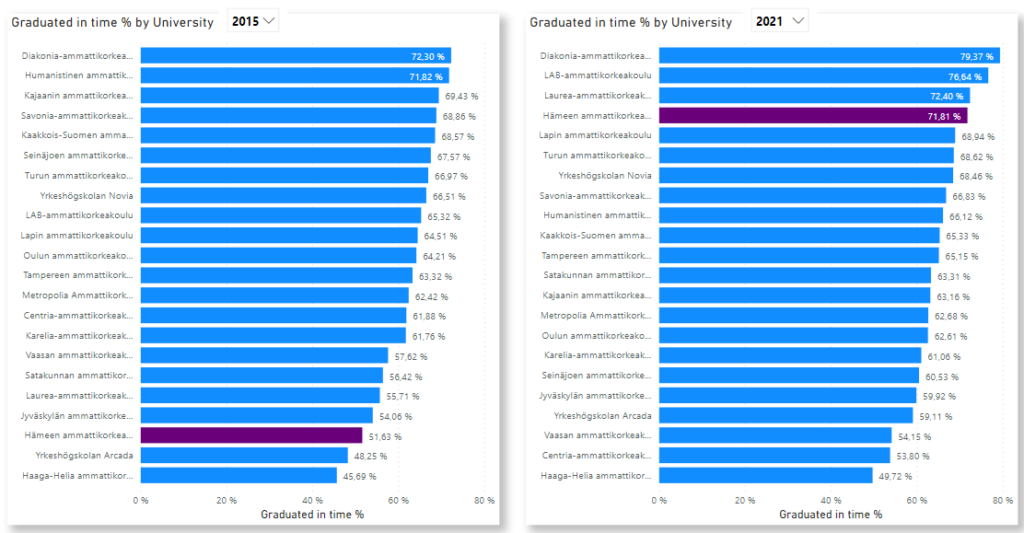HAMK has transparent information on students’ admission procedures and study paths
All relevant information on student admission and recognition of prior learning is easily accessible and transparent. Study applicants can find various information on HAMK’s website – in both Finnish and English languages. The website is well structured and informative. Various entryways to HAMK’s programmes are possible, because most of HAMK’s degree programmes offer so-called Study Paths. They consist of modules and courses in the first year of a Bachelor’s degree and studies in the first semester of Master’s degrees. Clear regulations as to RPL, as well as credit transfer possibilities, ensure flexible learning and study completion paths for applicants and students. In the interviews, it became clear that the recognition of previous studies is based on clear regulations and works well.
Clear process descriptions, as well as written guidelines, provide a sound basis for transparency and equality in the admission procedures. The audit team confirms that admission criteria are openly shared and found that they are written in a clear and comprehensible language. HAMK promotes the equality of both applicants and students. Clear instructions that ensure the quality of operations and equal treatment of students are proof of that. Good examples are the Equality Guidelines for students and applicants and Starter Kit of Digital Skills for new students, which helps them to start using HAMK online tools, equipment, environments, and methods already before the actual studies start. This involves digital badges with which the students can demonstrate their competence and helps students to navigate through the studies.
The competence development of HAMK teachers is well taken care of
Particularly due to the Covid-19 pandemic, it has become a necessity for all HAMK teachers and students to learn and teach in online courses. Here, the teachers’ competence development with regards to the implementation of online studies was very well supported. A good example of practice concerning the development of teaching skills is the HAMK100 personnel training programme. The interviews confirmed that HAMK is offering many opportunities, such as open badges, on-the-job-learning, mentoring, study circles, online coaching and digi-pedagogical training for developing competence for its staff, based on competence mappings.
In the interviews, it was underlined that HAMK consistently maps the competences required and to be developed, catering comprehensively for staff competence development. One good example of this is the progress in team teaching and peer learning. In discussions with those responsible in the rectorate and faculties, the audit team was able to gain evidence that the measures were developed and decided upon after thorough preliminary clarifications and in-depth consultations and are therefore well accepted and supported among the teaching staff throughout the university.
Focusing on the success and well-being of students
HAMK’s student-centred approach, which begins while designing educational programmes that aim at developing students’ competences for work-life and practice, is fostered by various opportunities of flexible learning paths and study methods. The students are guided by a multi-professional network of actors as well as staff and student representatives and tutors, throughout the entire learning process with regard to their professional and personal skills. This competence-enhancing and motivating study environment also means provision of efficient and flexible support services.
HAMK’s learning platform, Moodle, and the students’ desktop, Pakki, as well as feedback systems like Spark and HowULearn, combined with the use of data from the Power BI system, strengthen the students’ self-direction and goal-oriented learning by making it possible to monitor their own studies. Hence, HAMK includes in their decision-making processes various information on the students’ learning processes, experiences of the learning environment, general working life skills and well-being related to studying.
In the interviews, students, as well as teachers, expressed their satisfaction with the digital services, as they are handy to use and well accessible. Through further feedback formats, such as the Rector’s student consultations, degree programme feedback discussions and student well-being survey, areas of further development as to services are identified and solutions are discussed. A good example of this is the Guidelines for Equality of students and applicants.
The student union HAMKO is also a key partner for HAMK, as they are involved in the monitoring of education, degree structures, quality and well-being. Students can also receive recurring individual guidance offered by student counsellors and tutors; for workplace questions and issues, HAMK’s career services provide advice and support. In the interviews, the participation of student representatives, i.e., board, management group and development groups, in quality assurance processes was emphasised as being very pronounced and so were the numerous services offered to make the student study experience at HAMK as beneficial and individual as possible.
In the interviews, students as well as teachers expressed their satisfaction with the digital services as they are handy to use and well accessible. Through further feedback formats, such as the Rector’s students’ consultations, degree programme feedback discussions, student well-being survey, areas of further development as to services are identified and solutions are discussed. A good example of this are the Guidelines for Equality of students and applicants. The student union HAMKO is also a key partner for HAMK as they are involved in the monitoring of education, degree structures, quality, and well-being. Students can also recur to individual guidance offered by student counsellors and tutors, for workplace questions and issues HAMK’s career services provide advice and support. In the interviews, the participation of student representatives, i.e. board, management group and development groups, in quality assurance processes was emphasised as being very pronounced and so were the numerous services offered to make students’ study experience at HAMK as beneficial and individual as possible.
